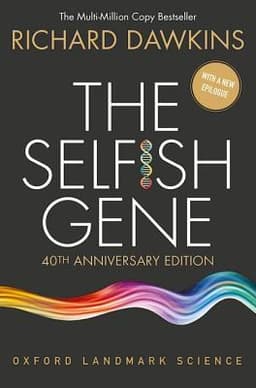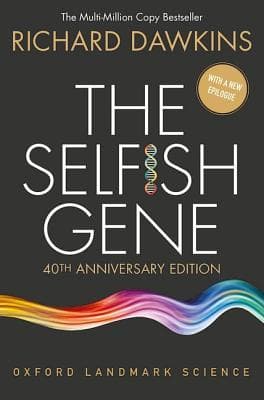
The Selfish Gene - 1 Minute Summary
Book by Richard Dawkins
Read the In-Depth 15 Minute Summary
The Selfish Gene: A Revolutionary Perspective on Life and Evolution
Richard Dawkins's groundbreaking book, "The Selfish Gene," challenges our conventional understanding of evolution and offers a fresh perspective on the driving forces behind life itself. At its core, the book proposes that genes, not individuals or species, are the fundamental units of natural selection. This idea turns traditional thinking on its head, suggesting that our bodies - and indeed all living organisms - are merely vehicles for genes to ensure their own replication and survival.
This gene-centric view of evolution provides fascinating insights into behaviors that might otherwise seem paradoxical. Altruism, for instance, is reframed not as a selfless act, but as a strategy genes use to propagate copies of themselves in relatives. The book explores how seemingly complex behaviors, from parental care to social cooperation, can emerge from the simple "selfish" drive of genes to replicate. Dawkins introduces concepts like inclusive fitness and evolutionary stable strategies, offering a new framework for understanding the intricate dance of competition and cooperation in nature.
One of the most intriguing aspects of "The Selfish Gene" is its exploration of extended phenotypes - the idea that genes' influences reach far beyond the bodies they inhabit. From the dam-building behavior of beavers to the mind-altering effects of parasites on their hosts, Dawkins shows how genes can manipulate the environment and even other organisms to ensure their own propagation. This concept blurs the lines between individual, species, and environment, presenting a more interconnected view of the natural world.
Perhaps the book's most revolutionary idea is the concept of memes - cultural units of information that replicate and evolve in a manner analogous to genes. This notion provides a powerful framework for understanding the spread of ideas, behaviors, and cultural practices in human societies. It suggests that much of what we consider uniquely human - our ideas, beliefs, and cultural norms - may be subject to a form of evolution separate from, but intertwined with, our genetic evolution.
While "The Selfish Gene" is primarily a work of scientific explanation, its ideas have profound implications for how we view ourselves and our place in the world. It encourages us to think critically about our behaviors and motivations, recognizing the ancient genetic influences that shape our actions. At the same time, it empowers us with the knowledge that we are not slaves to our genes. Understanding the selfish gene perspective allows us to make more informed decisions, potentially even "rebel" against our genetic predispositions when they no longer serve us. In essence, Dawkins's work invites us to see ourselves as part of a grand, ongoing evolutionary process - not merely its products, but active participants in shaping the future of life on Earth.
Related Content


The Selfish Gene Book Summary
Richard Dawkins
"The Selfish Gene" revolutionizes our understanding of evolution by arguing that genes, not individuals or species, are the fundamental units of natural selection, driving the behaviors and adaptations we observe in living organisms through their relentless pursuit of self-replication.
"The Selfish Gene" revolutionizes our understanding of evolution by arguing that genes, not individuals or species, are the fundamental units of natural selection, driving the behaviors and adaptations we observe in living organisms through their relentless pursuit of self-replication.
Philosophy
Science
Biology

